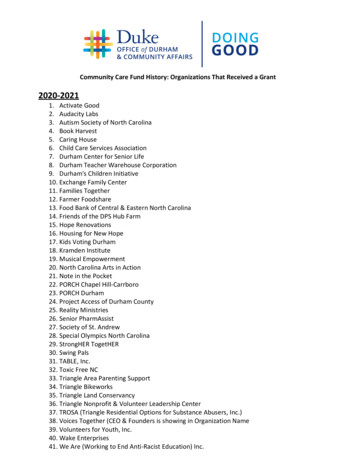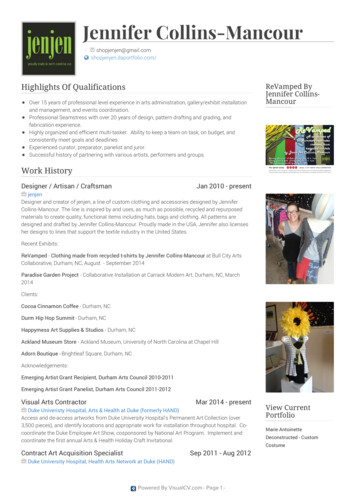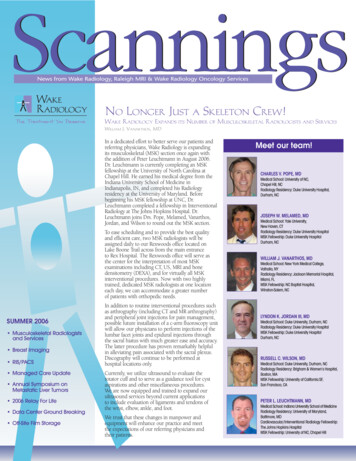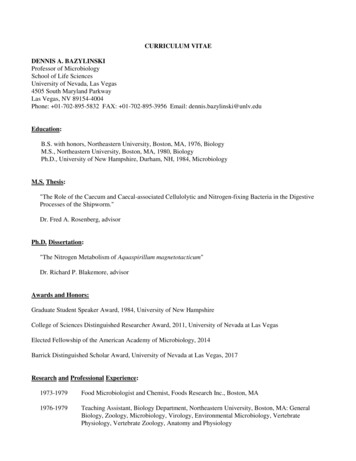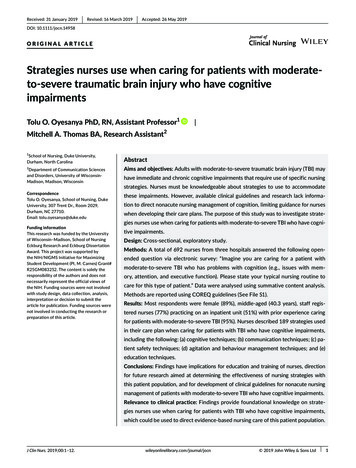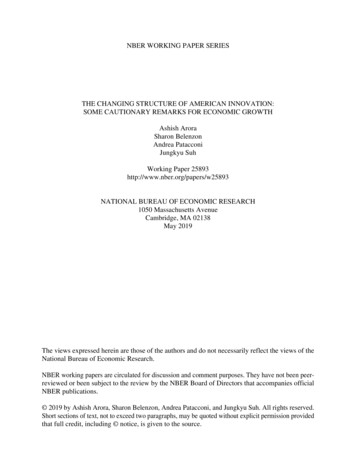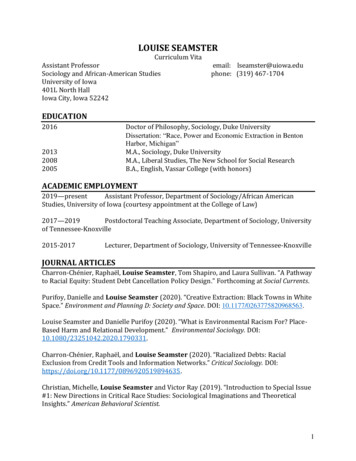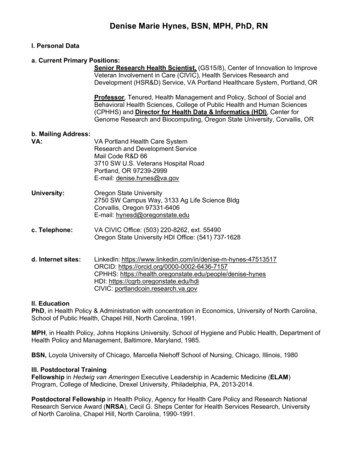
Transcription
Durham Research OnlineDeposited in DRO:11 February 2015Version of attached le:Accepted VersionPeer-review status of attached le:Peer-reviewedCitation for published item:Jones, D. G. B. and Tada jewski, M. (2015) 'Origins of marketing thought in Britain.', European journal ofmarketing., 49 (7/8). pp. 1016-1039.Further information on publisher's Publisher's copyright statement:This article iscEmerald Group Publishing and permission has been granted for this version to appear herehttp://dro.dur.ac.uk/14431/. Emerald does not grant permission for this article to be further copied/distributed orhosted elsewhere without the express permission from Emerald Group Publishing Limited.Additional information:Use policyThe full-text may be used and/or reproduced, and given to third parties in any format or medium, without prior permission or charge, forpersonal research or study, educational, or not-for-pro t purposes provided that: a full bibliographic reference is made to the original source a link is made to the metadata record in DRO the full-text is not changed in any wayThe full-text must not be sold in any format or medium without the formal permission of the copyright holders.Please consult the full DRO policy for further details.Durham University Library, Stockton Road, Durham DH1 3LY, United KingdomTel : 44 (0)191 334 3042 Fax : 44 (0)191 334 2971https://dro.dur.ac.uk
Origins of Marketing Thought in BritainD. G. Brian Jones, Quinnipiac UniversityMark Tadajewski, Durham UniversityFebruary 6, 2015Forthcoming in European Journal of MarketingStructured AbstractPurposeThe purpose of this paper is to document contributions to the early study and teaching ofmarketing at one of the first universities in Britain to do so and, in that way, to contribute to theliterature about the history of marketing thought. Given that the first university business programin Britain was started in 1902, at about the same time as the earliest business programs inAmerica, the more specific purpose of this paper was to explore whether or not the sameinfluences were shared by pioneer marketing educators on both sides of the Atlantic.Design/methodology/approachAn historical method is used including a biographical approach. Primary archival sourcematerials included unpublished correspondence (letter-books), lecture notes, seminar minutebooks, course syllabi and exams, minutes of senate and faculty meetings, university calendars,and other unpublished documents in the William James Ashley Papers at the University ofBirmingham.FindingsThe contributions of William James Ashley and the Commerce Program at the University ofBirmingham to the early twentieth century study and teaching of marketing are documented.Drawing from German influences similar to those on pioneer American marketing scholars,Ashley used an historical, inductive, descriptive approach to study and teach marketing as part ofwhat he called “business economics”. Beginning in 1902, Ashley taught his students about arelatively wide range of marketing strategy decisions focusing mostly on channels of distributionand the functions performed by channel intermediaries. His teaching and the research of hisstudents shares much with the early twentieth century commodity, institutional, and functionalapproaches that dominated American marketing thought.Research limitations/implicationsWilliam James Ashley was only one scholar and the Commerce Program at the University ofBirmingham was only one, although widely acknowledged as the first, of a few early twentiethcentury British university programs in business. This justifies future research into the possiblecontributions to marketing knowledge made by other programs such as those at the University ofManchester (1903), University of Liverpool (1910), and University of London (1919).Originality/valueThis paper adds an important chapter to the history of marketing thought which has beendominated by American pioneer scholars, courses, literature, and ideas.1
IntroductionAt the turn of the twentieth century, England had one of the largest, most developed economiesin the world and an advanced system of postsecondary education including, for example, OxfordUniversity, Cambridge, and the London School of Economics. The British economy measured inGDP at that time was the fourth largest in the world behind only China, America, and Germany(Maddison, 2007). Despite a lower rate of industrial growth than her major foreign competitors,American and Germany, growth in commercial occupations dramatically outstripped that ofother professions in Britain (Sanderson, 1972). At a time when the study and teaching ofmarketing was emerging in America, one would think that comparable developments wereoccurring in Britain.The contribution of this paper is to the history of marketing thought. That particular fieldof study was pioneered by Bartels (1951; 1962) who chronicled the early development ofAmerican university courses and textbooks in marketing. American business schools were likelythe first institutions of higher education in the world to offer courses of instruction in what weknow today as marketing. In 1902 marketing courses were first offered at the Universities ofMichigan, California, Illinois, and New York University, although “The Distributive andRegulative Industries of the United States”, offered in the second semester of the 1901-02academic year by Edward David Jones at the University of Michigan preceded the others by atleast one semester (Jones, 1912, chapter 2; Maynard, 1941). As Jones’s course illustrates, theterm “marketing” did not usually appear in the earliest university course titles or, for that matter,in the first periodicals and books published about marketing. Terms such as “commerce”, “trade”and “distribution” were often synonymous with the idea of marketing as we think of it today(Jones and Shaw, 2002; Lazer, 1979). The timing of these developments in America and theterminology used in early marketing courses are important for the context of our study here ofcomparable developments in Britain.Bartels (1951) identified two major centers of early twentieth century development in thestudy and teaching of marketing in America – the University of Wisconsin and the HarvardBusiness School. A deeper examination of the influences on the pioneer marketing scholars atthose two institutions as well as others in America revealed strong influences by the GermanHistorical School of Economics including an ideology based on social welfare and distributivejustice, a pragmatic approach to instruction that included seminars and field trips for the purposeof observing practicing business managers and farmers, and an historical, inductive, descriptive,statistical approach to studying marketing as an applied branch of economics that, in America,became known as institutional economics and resulted in many early contributions to all threetraditional schools of marketing thought – the functional, commodity, and institutional schools(Jones and Monieson, 1990). The focus of German economic historians on social welfare anddistributive justice was manifested in macromarketing themes in early American marketingthought. Their pragmatic approach to teaching was, of course, intimately connected with theirhistorical, inductive method of research contributing to the development of the case method ofteaching in America which Converse (1945, p.10) noted as one of the most important concepts ortechniques in marketing.2
Most research into early collegiate marketing education has focused on the USA no doubtbecause that is where it first developed and because the American model of business educationwas later adopted throughout Europe and Japan (Engwall and Zamagni, 1998). There are ahandful of studies of early marketing education in other countries including Canada (Jones,1992), Japan (Usui, 2008), Denmark (Madsen and Pederson, 2013), and Sweden (Jonsson,2009). However, very little research has been published about early contributions to marketingeducation in Britain. Compared with America and Germany, Britain was slow to develop aformal system of business education, likely due in part to a traditional anti-vocational, antitechnical bias in the British education system (Engwall and Zamagni, 1998; Sanderson, 1972;Vincent and Hinton, 1947). The purpose of a British university at that time was generallyconsidered as providing a liberal education. Commercial education was considered by some inBritain to be something “cheap and nasty” (Bryce, 1899, p.696). While there was a noticeablemovement towards higher education in business during and since the 1950s, as recently as the1990s only two percent of directors of 2,000 British stock-market-quoted companies had anMBA (Engwall and Zamagni, 1998, p,14). Walker and Child (1979) examined the history ofprofessionalism in British marketing including the training offered to those in marketingoccupations. They focused on the British Sales Managers Association which was founded in1911 and noted an absence of courses in British universities relevant to selling (1979, p. 30)quoting a trade periodical editorial from 1922 that sarcastically expressed doubts as to whether“any British university provided knowledge of greater value to the enthusiastic and potentiallycompetent salesman than could be acquired at any public elementary school” (Sales Promotion,1922, p.133). Wills (1978) suggested that since the first British business schools (Bradford andCranfield) did not exist until the early to mid-1960s, marketing was not taught in Britishuniversities until then. We assume that Wills’ definition of business schools omitted otheruniversity programs in business that were not offered, strictly speaking, in a business “school”.In any case, it seemed unlikely to us that business programs offered by British universities earlierin the twentieth century included no study or teaching of marketing.As long ago as the eighteenth century there was a relatively well-known proposal forformal business education in England (Norwood, 1961; Redlich, 1957). Among the eight subjectareas in Postlethwayt’s (1774) proposed British Mercantile College was “A General Survey ofTrade and Commerce” including marketing-related material such as the importance of tradingport to port, knowing how and where to “buy cheap and sell dear”, and skill in freighting andhiring out ships. Redlich (1957) considered Postlethwayt’s proposal as one of the earliest for theacademic instruction and training of merchants in Europe and certainly the earliest in England (p.40) but it never came to fruition. The idea of collegiate training for business then lay dormant inEngland for about 100 years until a proposal for commercial courses in 1852 at King’s College,London, but nothing came of that plan either (Redlich, 1957, p.73).At the turn of the twentieth century, three British universities – the London School ofEconomics, Cambridge University, and the University of Birmingham – made strides towardhigher education in business (Sanderson, 1972). When the London School of Economics wasfounded in 1895 it was the first in England to provide training in economics and was to haveincluded training for business, but instead became more a school for civil servants and politicians(Engwall and Zamagni, 1998). A degree program in commerce was not instituted there until1919 (Smith, 1928). At Cambridge University, Alfred Marshall’s’ economic tripos was approved3
in 1903. It was an attempt to link the study of economics more closely to business and industry(Sanderson, 1972). The curriculum included economic history, law, the structure and problemsof modern industry, wages and conditions of employment, banking, and international trade(Nishizawa, 2002). However, while Marshall succeeded in making the study of economics atCambridge more relevant to business, it was not really intended as a business or commerceprogram in the sense of those in America or Germany at that time (Smith, 1928; Sanderson,1972).The Faculty of Commerce at the University of Birmingham founded in 1902 under thedirection of William James Ashley was the first such British university program to providehigher education in business (Ashley, 1938; Fauri, 1998; Redlich, 1957; Sanderson, 1972; Usher,1938), indeed the first in the British Commonwealth. There soon followed commerce programsat Manchester University (1903) and the University of Liverpool (1910). However, we focushere on the University of Birmingham. The founding dean, William James Ashley, designed theUniversity of Birmingham’s Commerce Program and taught the courses considered to be thecore of that program.The purpose of this paper is to document contributions to the early study and teaching ofmarketing in Britain and, in that way, to contribute to the literature about the history ofmarketing thought. Given that the Birmingham Commerce Program was started in 1902, at aboutthe same time as the earliest business programs in America, a more specific purpose of this paperwas to explore whether or not the same influences were shared by pioneer marketing educatorson both sides of the Atlantic. Was marketing or marketing-related material part of the early studyand teaching of business at the University of Birmingham? And if so, what was the nature of anysuch marketing ideas and the influences on their development?Primary Source Material and AnalysisHistorical research requires a coherent recreation of what happened in the past and thesignificance of what happened. Primary source materials are important for historical researchbecause they allow the historian to get into the minds of the subjects, to see the world as thesubjects did (Fullerton, 2011). Further in that connection, it’s important to understand the past onits own terms. While the idea of “marketing” may have shared much with our understandingtoday, it was nevertheless different, at least in terminology. Source materials must be readcritically since much of the writing in any time period is written for self-serving purposes oradvocates a particular point of view.This study relies in part on a biographical approach, that is, where the lives of significantindividuals are documented in a thorough, systematic, and critical way. We began our researchby identifying the first British university to offer business studies (and therefore, we assumed,marketing) – the University of Birmingham. It quickly became apparent that the driving forcebehind the design of the curriculum and teaching the courses most likely to include marketingideas, was William James Ashley, and that his education and prior experience studying andteaching economics, and therefore the influences on his ideas, were shared by many of thepioneers in American marketing education.4
The William James Ashley Papers held at the Cadbury Research Library, University ofBirmingham Archives, was an important collection of primary source materials for this study.The Ashley Papers include correspondence between Ashley and key individuals such as theGerman economic historian, Lujo Brentano (see also, McCready, 1955), and Americaninstitutional economists Richard T. Ely and Henry C. Adams, photocopies of lecture notes,unpublished papers and presentations by Ashley, as well as the minute books of Ashley’scommerce seminar. Other relevant archival sources included University of Birmingham coursesyllabi and exams, minutes of the Commerce faculty meetings, university calendars, letter booksof the Dean of the Faculty of Commerce (Ashley), and other unpublished manuscripts includingone student’s complete set of notes for Ashley’s course on Business Policy, a veritable gold mineof insights into that course. As another student wrote in Ashley’s obituary, “As a lecturer hisslow speech and long pauses made it easy for students to ‘get him all down’, and manynotebooks must have been verbatim reports” (Heaton, 1927, p.684).There were two separate but related themes in Ashley’s published work, economichistory and business education. His earlier research in economic history earned him “quick anddeserved success he stood in the first rank of historians but wrote no more history forthirteen years after his return to England [in 1901]” (Clapham, 1927, p.681), and little of it evenlater in his career. Most of his publications after returning to England were about businesseducation. While they are published materials, Ashley’s writings about business educationduring the time that the Birmingham Commerce program was founded are neverthelessconsidered primary sources since they came into existence during the period of interest. There isalso a small, but useful, literature about the history of the University of Birmingham, its Facultyof Commerce, and other biographical material about Ashley (Smith, 1974; 2006), and thesematerials helped establish the historical context for the study of marketing at the University ofBirmingham in the early twentieth century.William James Ashley and the Faculty of Commerce at the University of BirminghamThe first British university degree program in business was the Faculty of Commerce founded in1902 at the University of Birmingham under the direction of William James Ashley (1860 –1927) who served as Dean and Professor of Commerce. The impetus for a faculty of commercecame from the Birmingham Chamber of Commerce in 1898 (Neil, 1902; Sanderson, 1972). In1900, after visiting “similar institutions in the United States and Canada”, an advisory committeeon commercial education recommended to the board of the University of Birmingham theformation of a Faculty of Commerce (Adamson, 1901). Smith (1974, p. 12) notes that thoseinstitutions visited by the advisory committee included the University of Wisconsin, where theirCourse in Commerce was formally established in 1900, as well as the Wharton School at theUniversity of Pennsylvania founded in 1881, and the University of California. As noted earlier,the University of Wisconsin was an early center of influence on marketing education and theUniversity of California was among the first to offer marketing courses in America (Jones, 2012,chapter 3). The University of Birmingham advertisement inviting applications for the Faculty’sfirst dean noted that “the Council does not wish to limit its choice by specifying in whatdepartment the first Professor shall be a specialist, but assumes that it will probably be in one ormore of the following subjects: Economics, Industrial Organization and Administration, Finance5
and Statistics, Commercial Law, or Commercial History” (Adamson, 1901, p.51). They neededsomeone who could clarify the content of what should be taught in commerce, then teach thatcurriculum, and sell the program to potential students as well as to employers in the BritishMidlands. They got that in the economic historian, William James Ashley.Ashley was born in London in 1860, the son of a journeyman hatter. Scholarships and atrust fund enabled him to study history under Arnold Toynbee at Oxford but with a stronginterest in economics. To develop the latter, Ashley also visited Germany no less than four times(1880, 1883-84 at the University of Heidelberg; and 1902) and studied the works of Germaneconomic historians, especially Lujo Brentano and Gustav Schmoller. Inspired by Toynbee andguided by the scholarship of the German Historical School of Economics, Ashley was laterconsidered by some to be the leader of the English Historical School of Economics (Koot, 1987;Scott, 1928). He has been compared with Gustav Schmoller, the leader of the so-called“younger” German Historical School, to whom Ashley dedicated his (1900) Surveys Historicand Economic. In that dedication, Ashley wrote “for a dozen years I have received more stimulusand encouragement from your writings than from those of any other” (Ashley, 1900, p.vi). In1910 Ashley also received an honorary doctorate from the University of Berlin. Of all theEnglish economic historians, “perhaps only Ashley was fully in sympathy with the Germanhistoricist aim of laying a foundation for a new and historical economic theory to be derivedinductively from patient historical research” (Koot, 1980, p.202). This placed Ashley in thecompany of American institutional economists who became pioneer scholars in marketing (Jonesand Monieson, 1990).His research in economic history focused mostly on the middle ages when marketing wascharacterized by the gild system where “there was a market, i.e. there was demand from personsoutside the family, but it was small and comparatively stable” (Ashley, 1887, p.72). His writingsabout this period focus on the various institutions including merchant gilds, journeyman clubs,and trade clubs of the middle ages, but primarily about the evolution of their legal rights ratherthan on the actual trading activities of these early marketing institutions.“Wants were comparatively few and unchanging; they were supplied by neighboringcraftsmen; consumer and producer stood in direct relation with one another. Suchregulations had regard, not only to the interests of consumers, but also to those of thecraft itself, which would be injured by the knavery of individual members. They[merchant gilds] only disappeared when production became much greater and aimed atsatisfying a wide and changing market” (Ashley, 1888, p. 95).Only then, after the disappearance of the gild system, during the fifteenth to eighteenth centuriesand what Ashley called the “domestic system” period, did marketing channels andmerchandising practices really develop.“ the master had lost his economic independence and no longer acted as a shop-keeperor merchant. He often received the raw material from, and always gave up the finishedgoods to a merchant, factor or middle-man of some sort who took the risk of thefluctuating demands of that greater market which had now come into existence” (1887,p.73).In 1888 at the age of 28 and after marrying Margaret Hill, Ashley was appointed the firstProfessor of Political Economy at the University of Toronto. In his first full time academic6
position he developed and taught courses on the elements of political economy, the history ofpolitical economy, and current economic issues. Most of his teaching was by lecture. However,he also organized an Economics Seminar, “at the weekly meetings of which students took turnsin reading a paper, acting as reporter, and acting as critic” (Ashley, 1938, p.40). In its method,the latter foreshadowed an important course he later taught at the University of Birmingham.Because his position was a new one at the University of Toronto, Ashley felt that hisinaugural lecture should explain what his subject comprised.“ .the great achievement of German thought in the last fifty years – the discovery andapplication of the Historical Method, had already transformed the study of Law when itpassed to Political Economy . It is asked what light is thrown upon the difficulties oftoday by merely antiquarian research into the gilds of the fourteenth century. Much more,perhaps, than the critic supposes. But the method I mean is the method of directobservation and generalization from facts, whether past or present; a method you can call‘inductive’ if you wish to be polite, or ‘empirical’ if you wish to indicate scorn Itseems to me that the economist could examine, for instance, the position of theagricultural interest in Ontario by just the same sort of method So the economist willnot aim at ending with a ‘law of rent’ or a ‘law of production’ based on Ontario facts, butwith a picture of Ontarian agriculture and of the influences that will affect it ” (Ashley,W.J., quoted in Ashley, A., 1932, pp.50-51).The value Ashley saw in the historical method was that an understanding of economic historywas the foundation to understanding current economic problems or conditions. He alwaysinsisted on the value of the inductive, historical method of study (Ashley 1900; 1902; 1903a;1903b; 1906; 1908), and that the study of economic history must have a practical purpose (1902;1906; 1908). “I have never been ashamed to be frankly and nakedly utilitarian in the curriculum Ihave recommended” (Ashley, W.J., quoted in Ashley, A., 1932, p.96).In 1892 Ashley left the University of Toronto to accept a position as the first Professor ofEconomic History at Harvard University where he spent the next nine years teaching courses ineconomic history and applied economics, and serving as associate editor of the QuarterlyJournal of Economics. One of his Harvard colleagues in economics at that time and editor of theQuarterly Journal of Economics was Professor Frank W. Taussig who, along with Edwin FrancisGay, was one of the founders of the Harvard Business School (Cruikshank, 1987). During histime in North America Ashley wrote and published extensively about English economic history(see especially, Ashley 1887; 1888; 1900). In his later lectures on commerce at Birminghamthere is tangible evidence of his belief that the study of economic history, specifically of theevolution of institutions involved in the distribution of goods, should have practical relevancesince some of the material in his own publications was used to set the foundation for discussionsof then-current commercial (including marketing) problems (e.g. Ashley 1887; 1888; 1900).We know that during his 13 years in America from 1888 until 1901 Ashley was aware ofthe training for business that was being developed then in American universities. Although theHarvard Business School did not open until 1908, toward the end of Ashley’s tenure at Harvardthere was increasing discussion there of the possibility of offering training for businessexecutives and Ashley’s “work at Harvard was being developed to meet these new needs”(Usher, 1938, p.151). The first dean of the Harvard Business School, Edwin Francis Gay, was an7
economic historian at Harvard who, like Ashley, was very much influenced by GermanHistorical Economics (Herbst, 1965; Jones and Monieson, 1990). The two shared a belief in thevalue of inductive, historical reasoning as the basis for studying and teaching business. Writingat about the time the Birmingham program was launched, Ashley also made direct references tothe commerce programs at the University of Wisconsin, University of Michigan, and theWharton School at the University of Pennsylvania (Ashley, 1902).Ashley longed to return to England and the opportunity to develop a new faculty ofcommerce at the University of Birmingham seemed a good fit with his views of economics andbusiness training. He was hired as the dean of the new faculty in July 1901 and courses were firstoffered in the autumn of 1902. From the inception of the program until 1909, Ashley was“responsible for the entire arrangement of lectures – in that year [1909] he passed responsibilityto individual lecturers for their own classes” (Smith, 1974, p.43; Ashley 1907, p.15). This isimportant because it highlights the influence that Ashley had, not only over the design of thecurriculum, but also over the content of most of the courses for the first several years of theCommerce program.During the year between his hiring in 1901 and the announcement of the curriculum in1902, Ashley visited Germany to investigate the German Handelshochschulen (BusinessSchools) at Cologne, Leipzig, Aachen, and Frankfurt. He later described these “Germaneducational experiments” in an article published in The Times.“ with regard to economics, which in some form or other furnishes the backbone ofevery curriculum in Germany that term includes a far wider range of topics treated inlarge measure descriptively, statistically, and historically, than is the case in England .It may, however, be also urged that in training future men of business, the economistshould not all the time occupy the standpoint of national production and distribution [asGerman Historical Economics did]; that he would do well to put himself in the positionof the individual man of business and that he should try to obtain from economicliterature and from current experience some light upon the way to tackle these generalquestions of policy which from time to time confront every merchant andmanufacturer . Here is the field for a true, industrial ‘Betriebswirtschaftslehre’,[business economics] which shall be more than that collection of coffee rules which issometimes dignified in Germany by the name” (Ashley, 1903a).Ashley believed that the study of business was essentially one of applied economics and that thehistorical method was best suited to developing knowledge of business. However, while theGerman Historical School of Economics provided a model of how to study and teach business,its focus on national or social (macro) economics was not particularly useful to businessmen(Locke, 1984; Meyer, 1998). The German Handelshochschulen recognized that gap but in 1902when Ashley was designing the business program at Birmingham their version of businesseconomics was inadequate - too narrowly focused on accounting, production, and engineering.Ashley would have to develop his own.When he returned to England from Germany, Ashley wrote his manifesto for the newprogram: “The Faculty of Commerce in the University of Birmingham – Its Purpose andProgramme” (1902). He clearly acknowledged that business schools in Germany and Americahad provided the “motivation” for the new Faculty of Commerce and, in particular, applauded8
the attitude of Americans toward the study of business. The Birmingham program would addressthe concerns, “not of the rank and file, but of the officers [of business firms], those who, asprincipals, directors, managers, secretaries, heads of departments, etc., will ultimately guide thebusiness activity of the country” (1902, p.1). In that way, Ashley was clearly differentiating hisprogram from the German business schools which he believ
D. G. Brian Jones, Quinnipiac University Mark Tadajewski, Durham University February 6, 2015 Forthcoming in European Journal of Marketing Structured Abstract Purpose . Manchester (1903), University of Liverpool (1910), and University of London (1919). Originality/value
